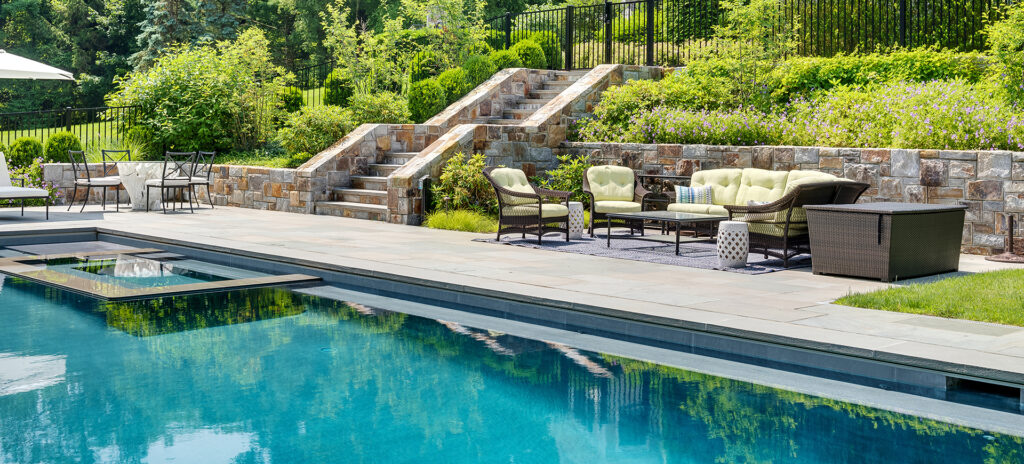Deciding to build a pool is the first step toward creating your dream backyard oasis. The next big choice, however, can feel overwhelming: what’s the difference between a saltwater and a chlorine pool? Many homeowners are surprised to learn that the answer to “Do saltwater pools still use chlorine?” is yes. This common misunderstanding can lead to costly pool maintenance mistakes.
The real difference between saltwater and chlorine pools lies in how that chlorine is produced and delivered. Chlorine pools rely on the manual addition of chlorine, offering predictable control but requiring frequent balancing. In contrast, saltwater systems use a generator to convert salt into chlorine automatically, which means fewer weekly chores but a higher installation cost and more expensive repairs. This guide will separate fact from fiction, explaining the pros and cons of saltwater vs chlorine pools so you can decide with clarity.
What’s the Difference Between a Saltwater and a Chlorine Pool?
Before weighing the pros and cons, it’s essential to understand how each system keeps your pool water clean, clear, and safe for swimming.
How Chlorine Pools Work
The traditional chlorine pool uses a time-tested method of pool sanitation that involves manually adding chlorine directly to the water.
- Traditional Sanitization: Homeowners add chlorine in the form of tablets, granules, or liquid. These chemicals dissolve and release hypochlorous acid, the active ingredient that sanitizes the pool.
- Control and Predictability: Many pool owners prefer this method because it offers precise control and is one of the advantages of chlorine over saltwater. If you have a heavy rainstorm or a big pool party, you can immediately “shock” the pool with an extra dose of chlorine to rebalance the water chemistry quickly.
How Saltwater Pools Work
A saltwater pool isn’t as salty as its name suggests. Its salt level is similar to that of human tears, at about one-tenth the concentration of the ocean.
- Electrolysis and Salt Cells: The heart of a saltwater system is a salt chlorine generator. As the lightly salted water passes through the generator’s cell, a process called electrolysis occurs, breaking down the salt and converting it into pure chlorine. This freshly produced chlorine then sanitizes the pool before converting back into salt, creating a continuous cycle that reduces daily pool maintenance.
- A Softer Feel: This constant, low-level introduction of pure chlorine is why the pool water comfort is so high. It also eliminates the harsh “chemical smell,” which is actually caused by byproducts of chlorine reacting with contaminants.
Pool Costs: Upfront Investment vs. Long-Term Spending
When choosing between a saltwater pool and a chlorine pool, the real financial decision lies in weighing upfront pool costs against ongoing expenses.
Pool Installation & Pool Conversion Costs
- Chlorine Pools: The upfront investment for a standard chlorine pool is lower. The necessary equipment, like a chlorinator or floating dispenser, is inexpensive and typically included in standard pool installation packages.
- Saltwater Systems: A saltwater system requires a significant initial investment. You can expect to pay thousands for the salt chlorine generator unit and professional installation.
Ongoing Maintenance Costs
- Chlorine Pools: The cost of maintaining a saltwater pool vs a chlorine pool is higher annually for chlorine. Depending on pool size and usage, expect to spend hundreds per year on chlorine tablets and shock treatments.
- Saltwater Pools: Your annual chemical costs are significantly lower. However, the lifespan of saltwater pool equipment must be considered. The salt cell must be replaced every 3 to 7 years for a price in the thousands.
Hidden Pool Ownership Costs to Watch For
- Corrosion Risk: The salt in saltwater pools is corrosive. It can damage and shorten the lifespan of metal components, including stainless steel ladders, handrails, underwater light niches, and some automatic pool covers. It is particularly aggressive toward heaters with copper components, so a heavy-duty, salt-compatible heater is essential.
- Energy Costs: The energy costs of a saltwater pool system must be considered. A salt chlorine generator needs to run with the pool pump to produce chlorine, which adds a small but steady amount to your electricity bill.
Are Saltwater Pools Easier to Maintain Than Chlorine Pools?
Your lifestyle and how much time you want to spend on pool maintenance will heavily influence your choice.
Chlorine Pool Maintenance Schedule
Maintaining a chlorine pool requires establishing a consistent schedule to keep the water balanced and safe. Routine tasks typically include:
- Testing the water chemistry 2-3 times per week.
- Adding chlorine tablets or liquid to the skimmer or feeder.
- Applying a shock treatment weekly or bi-weekly to eliminate contaminants.
- Monitoring stabilizer levels: Many chlorine tablets contain cyanuric acid (CYA) as a stabilizer. Over time, CYA can build up and lead to “chlorine lock,” where the chlorine in the water becomes ineffective. This requires partial draining and refilling to correct.
Saltwater Pool Generator Maintenance
Saltwater pool maintenance is more hands-off weekly, but it is not a “no-maintenance” solution.
- Fewer Chemical Additions: You won’t be handling chlorine regularly. The generator does the work for you, maintaining a steady level of sanitizer.
- Constant pH Management: The process of creating chlorine in a saltwater pool naturally causes the water’s pH to rise. You will need to test the pH frequently and regularly add a pH decreaser to keep it balanced.
- Inspecting the Salt Cell: The generator’s cell needs to be inspected and cleaned every few months to remove calcium buildup, which can impede its performance and shorten its life.
- Higher Repair Costs: If the generator or control board fails, repairs can be complex and expensive compared to the simple components of a chlorine system.
Saltwater vs Chlorine Pool Health Benefits & Pool Water Comfort
How the water feels is a top priority for many homeowners. This is where the difference between saltwater and chlorine pools is most apparent.
Water Feel & Swimmer Comfort
- Saltwater Pools: The water in a saltwater pool feels noticeably softer and silkier on the skin. Swimmers often report less irritation to their eyes and skin, and their hair doesn’t feel as dry or brittle after a swim. The absence of a strong chloramine odor also enhances the swimming experience.
- Chlorine Pools: Traditional chlorine pools can sometimes cause dry skin, red eyes, and that familiar “pool smell.” While a perfectly balanced chlorine pool minimizes these issues, the water in a saltwater system is generally considered more comfortable.
Health & Sensitivity Factors
- Saltwater pools for sensitive skin: Those with skin conditions like eczema or allergies often find the gentle water of a saltwater pool much more pleasant.
- Chlorine pools for precise control: For those without sensitivities, a well-maintained chlorine pool is perfectly safe and offers the ability to quickly adjust sanitizer levels in response to usage, ensuring the water is always properly sanitized.
Which is the Best Pool Type for Families and Different Lifestyles?
Ultimately, the best choice depends on you. The saltwater vs. chlorine comparison comes down to how you want to manage your time, budget, and comfort.
- For the Hands-On Homeowner: If you prefer having direct control over your pool’s chemistry and don’t mind a weekly routine, a chlorine pool is an excellent choice.
- For the Low-Maintenance Seeker: If your goal is to minimize daily and weekly chores, a saltwater system is hard to beat. The automated chlorine production frees you from constantly handling chemicals.
- For Families with Kids or Sensitive Skin: For those who prioritize swimmer comfort, a saltwater pool often wins. The softer water is gentler on the eyes and skin, making it a popular choice for families with young children or anyone with skin sensitivities.
Pool Conversion: Making the Switch to a Saltwater Pool
When It Makes Sense to Convert
Can you convert any pool to saltwater? Generally, yes, but it’s a popular upgrade that’s not right for every pool. It makes the most sense if:
- Your Budget Allows for It: You are prepared for the initial investment for the salt chlorine generator and installation.
- You Want Less Weekly Upkeep: You are looking to simplify your pool maintenance routine and reduce the amount of time you spend handling and storing chlorine.
- Your Equipment is Compatible: Before converting, check that your pool heater, underwater lights, ladders, and liner are compatible with saltwater. Salt is corrosive, and older equipment not designed for it can degrade quickly, leading to expensive replacement costs.
What to Expect During the Pool Conversion
The process is quick and simple for a professional, who can best answer how much it costs to convert a pool to saltwater based on your specific setup.
- Installation: An expert will install the salt chlorine generator into your pool’s existing plumbing system and wire its control panel.
- Adding Salt: The correct amount of high-purity pool salt is added directly to the water, where it dissolves.
- Downtime: The process typically only takes a few hours, meaning your pool will be up and running as a saltwater pool the very same day.
Debunking Common Myths about Saltwater Pools and Chlorine Pools
To make the best choice, it helps to clear up a few final misconceptions.
- Myth: “Saltwater pools are chlorine-free.”
- Reality: They use a generator to produce their own chlorine from salt.
- Myth: “Saltwater pools require no maintenance.”
- Reality: The pool maintenance is different, with less frequent chemical handling, but requires constant pH management and regular equipment checks.
- Myth: “Chlorine pools are harsh and unsafe.”
- Reality: When properly managed, the chlorine levels in a traditional pool are safe and effective. The “harshness” often comes from imbalanced water chemistry, not the chlorine itself.
Ready for Your Custom Swimming Pool?
Choosing the right pool system protects your investment, simplifies your pool maintenance, and enhances your backyard living. At Shoreline Pools, our experts have guided countless homeowners through the decision between saltwater and chlorine pools, ensuring every family finds the best fit for their backyard. Call us today at (203) 357-1544 to get personalized advice for your dream pool.




